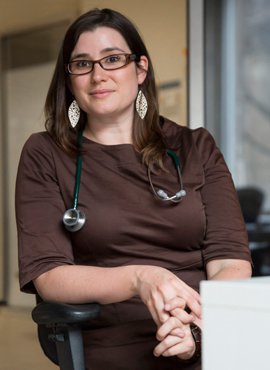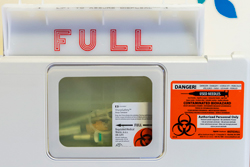
Christy Sutherland (MD’08): The Addicts’ Advocate
By Mark Campbell
Dr. Christy Sutherland (MD’08) couldn’t believe what she was reading. There, in the pages of Canada’s national newspaper, was an editorial by an emergency doctor arguing that addiction is not a disease.
“It’s so frustrating,” Dr. Sutherland sighs. “Being an addiction doctor often feels like an uphill battle. Cardiologists don’t have to argue that a heart attack is an illness. We have imaging studies that show brain changes that happen because of addiction. There are DNA transcription changes that happen. But there’s still this leftover narrative from long ago that addiction is a choice.”
For thousands of Canadians, there is no choice. There’s only the addiction that takes over their lives, making it impossible to hold down a job, keep a roof over their heads or stay out of jail. But so long as there are people like Dr. Sutherland focused on treating addiction, there is hope. The Dalhousie Medical School and UBC graduate has been making a difference as a family doctor and addiction medicine physician with the Portland Hotel Society in Vancouver. This non-profit is unique in Canada for providing social housing – known as hotels – and support for people living with addiction and related disorders. Experience has taught her that a place to live and access to healthcare are vital in helping addicts on the journey toward abstinence, not only giving them a greater sense of dignity and a better quality of life, but also helping to make our communities safer.

“Police have told us that crime is down in the neighbourhood,” says Dr. Sutherland, who has served as executive director of the Society’s Bosman Hotel Community and is now co-medical director of the Society. “We did an internal study looking at court dates and the number dropped from an average of 12 a year to two once people moved in here. Hospital visits went down, and admissions went down. We’ve also seen people develop relationships and get involved with hobbies. There are so many victories to celebrate with people along the way.”
The path to victory
Each victory is one more step on the path to overcoming addiction. Yet, the obstacles to achieving that goal are formidable. For one, there is that lingering perception that addicts could turn their lives around if they’d only make smarter, healthier choices. Dr. Sutherland argues it isn’t that easy.
“People with addiction hate the drugs they are addicted to, and they’re suffering, but they can’t stop because of their illness. The drug has hijacked their neuro-circuitry and is telling their brains that crack has the same importance as water. So telling someone to stop smoking crack has the same efficacy as telling them to stop drinking water.”
There is also public resistance to treatment options such as methadone clinics, despite evidence that it improves health and reduces crime rates. Meanwhile, limited resources

mean governments do not invest in clinics and detox facilities, and overarching public policies provide little protection for addicts, resulting in deaths that otherwise could be avoided. And then there is the guilt and shame associated with addiction.
“People with high blood pressure don’t feel guilty about it, but addicts will be hard on themselves or embarrassed about a relapse and not want to tell you. I always say, ‘You have a chronic disease I’m helping you manage and we should treat this like we would any other disease. Our clinical picture has changed, so let’s change our management, but let’s not be so hard on ourselves.’”
In the face of such challenges, the work of Dr. Sutherland and the Portland Hotel Society is particularly vital. “I love working with medicine and housing together. It’s ideal because often with addiction medicine, it’s the follow-up that gets lost. But if you’re going to the addict’s house and working with their housing team, you follow and help them through the ups and downs of their illness.”
Care and compassion
Originally from Halifax, Dr. Sutherland first became interested in helping people with the ups and downs of illness by watching, and later helping, her parents care for her aunt. She enrolled at Dalhousie in part because of its reputation, but also because extended family had studied medicine there and loved the experience. Dr. Sutherland did too.
“I feel so lucky that I got to go there. So much of the time, medical school can be grueling. You work so much and see so much suffering that it can cause burn out and take away your passion. I think Dalhousie works hard to ensure you remain a compassionate human being through those four years.”
She recalls one professor in particular, Dr. Karen Mann, who shaped her approach to patient care. “We had a week in the internal medicine service where we had a lot of patients die. She said every death should be clean, warm and comfortable. That attention to care is something I’ve carried forward with me.”
 It wasn’t until her residency at UBC that Dr. Sutherland found her calling. “Before that, I didn’t even know that addiction medicine existed,” she says. Since then, it has become her life’s focus. In addition to her work with the Portland Hotel Society, Dr. Sutherland consults at St. Paul’s Hospital on treatments for inpatients with addictions, teaches addiction medicine at UBC, and advocates for societal change on behalf of her patients.
It wasn’t until her residency at UBC that Dr. Sutherland found her calling. “Before that, I didn’t even know that addiction medicine existed,” she says. Since then, it has become her life’s focus. In addition to her work with the Portland Hotel Society, Dr. Sutherland consults at St. Paul’s Hospital on treatments for inpatients with addictions, teaches addiction medicine at UBC, and advocates for societal change on behalf of her patients.
As for future plans, Dr. Sutherland is looking to expand clinical services in all of the housing operated by Society. But would she transition into politics to advocate for her patients?
“Maybe, someday. I’ve discovered I really love clinical work, so I know I’m going to be a clinician my whole life long, but we’ll see what happens.”